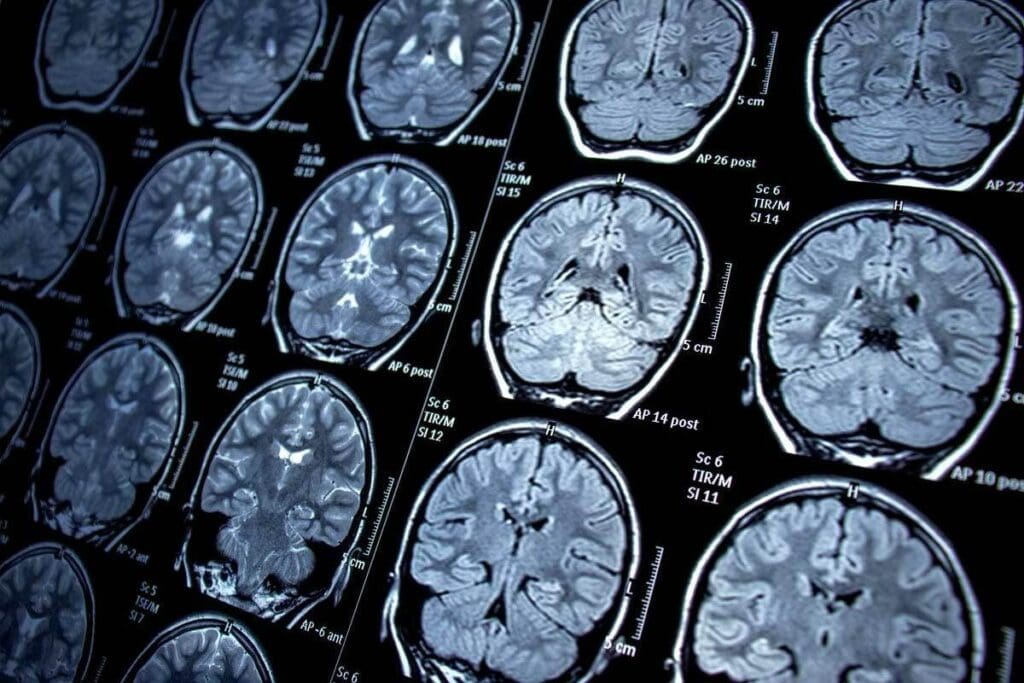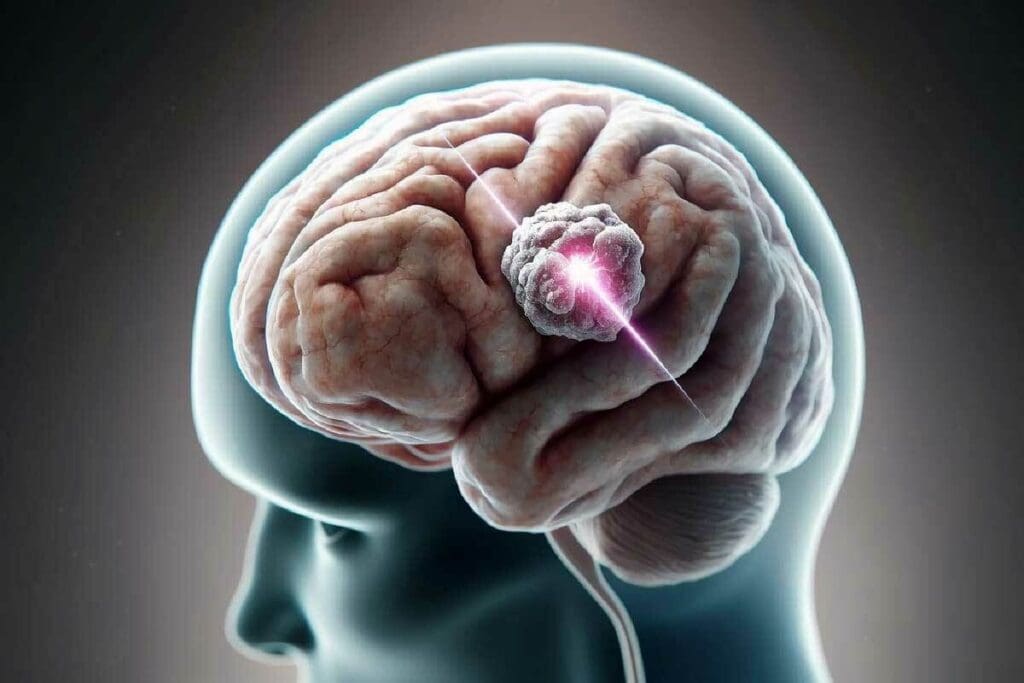
At Liv Hospital, we know that nausea and unexplained vomiting can mean more than just stomach issues. These signs might point to a serious problem, like a brain tumor.
Every year, about 40,000 to 50,000 new brain tumors are found. If you’re feeling nauseous without reason, it’s a sign to get checked. We’ll look at the important signs to watch for. This will help our global audience know when to see a doctor.
Key Takeaways
- Understanding the link between nausea and brain tumors is key to early detection.
- Unexplained nausea and vomiting can be a sign of a brain tumor.
- Every year, 40,000 to 50,000 new brain tumors are found.
- Watch for key symptoms and signs to seek medical attention.
- Early detection is vital for better outcomes in brain tumor treatment.
The Science Behind Brain Tumor Nausea

Nausea from brain tumors is a complex issue. It can come from many causes, like high pressure inside the skull. Knowing how brain tumors cause nausea is key for both patients and doctors.
How Brain Tumors Trigger Nausea Responses
Brain tumors can make you feel sick to your stomach in several ways. One main reason is by raising the pressure inside the skull. This can push on or move parts of the brain that help control feeling sick, like the area postrema. Tumors can also mess with brain areas that handle nausea and vomiting, making you feel really sick.
Studies show that where and how big the tumor is matter a lot. For example, tumors in the back of the skull or those that block fluid flow are more likely to make you feel sick. A study in an oncology journal found that knowing the details of a tumor is key to managing its symptoms well.
Types of Brain Tumors Most Associated with Nausea
Some brain tumors are more likely to make you feel sick because of where they are, how fast they grow, or how they affect the brain around them. These include:
- Medulloblastomas: Found in the cerebellum, these tumors can block fluid flow and cause nausea.
- Ependymomas: Growing from cells lining the ventricles, these tumors can cause fluid buildup and high pressure, leading to nausea.
- Glioblastomas: Being very aggressive and growing fast, glioblastomas can put a lot of pressure on the brain and cause nausea.
| Tumor Type | Common Location | Association with Nausea |
| Medulloblastoma | Cerebellum | High |
| Ependymoma | Ventricles | Moderate to High |
| Glioblastoma | Cerebral hemispheres | Variable, depending on tumor size and location |
Knowing which brain tumors are more likely to cause nausea helps in spotting and treating this symptom early. This can greatly improve patient care.
Do Brain Tumors Cause Nausea? The Research Evidence

Research shows that brain tumors can cause nausea. This symptom greatly affects the lives of many patients. Studies have looked into how brain tumors and nausea are linked, giving us important information.
Clinical Studies on Brain Tumor Symptoms
Many studies have looked into the symptoms in patients with brain tumors. They found that nausea is a common problem. For example, a study in a well-known medical journal showed that about 40% of patients with brain tumors experience nausea.
The reasons for nausea in brain tumors are complex. Tumors can press on parts of the brain that control nausea. They can also cause inflammation and irritation, leading to nausea. Knowing how this happens helps in finding better ways to manage it.
Statistical Prevalence of Nausea in Brain Cancer Patients
Studies have shown how common nausea is in brain cancer patients. It’s one of the top symptoms, along with headaches and problems with thinking. A detailed review found that about 50% of brain tumor patients have nausea at some point.
The chance of getting nausea can change based on the tumor’s type, size, and where it is. It also depends on the patient’s overall health. This shows why treating nausea is key in caring for brain cancer patients.
Key Findings:
- Nausea is a big problem for many brain tumor patients.
- Up to 50% of brain cancer patients experience nausea.
- The type, size, and location of the tumor affect nausea risk.
Understanding the research helps doctors manage nausea in brain tumor patients. This improves their quality of life.
Morning Nausea: A Distinctive Brain Tumor Warning Sign
Morning nausea might be a sign of brain tumors. It’s important to know why it happens and what it means. We’ll look into why morning nausea is a big deal and if it could be a cancer sign.
Why Brain Tumor Nausea Often Peaks in the Morning
Nausea from brain tumors gets worse in the morning. This is because of more pressure in the brain when we sleep. Fluid builds up, putting more pressure on the tumor and tissues, making symptoms worse.
Neurologists note, “The increase in intracranial pressure at night can cause morning nausea in patients with brain tumors. This is a symptom that needs medical attention.”
“The increase in intracranial pressure during the night can cause morning nausea in patients with brain tumors. This is a critical symptom that warrants medical attention.”
A neurologist highlights.
Is Morning Nausea a Sign of Cancer?
Morning nausea can mean different things, but it’s a warning sign if you have other symptoms too. We need to look at all symptoms, like headaches or vision problems, and your overall health.
| Symptom | Possible Indication |
| Persistent Morning Nausea | Potential sign of increased intracranial pressure |
| Accompanying Headaches | May indicate tumor presence or growth |
| Vision Disturbances | It could be related to tumor pressure on the optic nerves |
If you have morning nausea that doesn’t go away, and other symptoms too, see a doctor. Early check-ups can find the cause and start treatment.
Knowing about morning nausea and brain tumors helps us spot warning signs early. We need to understand brain tumor symptoms well to get the right treatment.
Brain Cancer Nausea Patterns and Characteristics
Brain cancer nausea can show up in different ways. It’s important to know these patterns and characteristics. This knowledge helps doctors diagnose and plan treatments.
Persistence and Duration of Symptoms
Nausea in brain cancer patients can last a long time or come and go. How long nausea lasts can tell doctors a lot about the tumor and its effect on the brain.
Studies show nausea can last from minutes to days. This shows how complex brain tumor nausea can be.
“The nausea was constant; it was like a shadow that followed me everywhere. It wasn’t just about feeling queasy; it was a deep, gnawing sensation that never seemed to go away.”
Quality and Intensity of Nausea Sensations
Nausea in brain cancer patients can feel mild or very intense. The severity can depend on the tumor’s location, size, and the patient’s health.
People often say nausea is more than just feeling sick. It can include dizziness and feeling unwell. Doctors need to understand these details to help patients better.
- Nausea can be triggered or worsened by certain movements or positions.
- The sensation of nausea can be accompanied by other symptoms such as headaches or dizziness.
- In some cases, nausea can be so severe that it leads to vomiting, which can have additional implications for the patient’s hydration and nutritional status.
Brain Tumor Vomiting: What Makes It Different
Vomiting from brain tumors can show up in various ways. But projectile vomiting stands out. It’s sudden and forceful, often without warning. We’ll look into why this happens and its link to brain tumors.
Projectile Vomiting as a Neurological Symptom
Projectile vomiting is a sign of neurological issues, like brain tumors. It happens when a tumor presses on the brain’s vomiting centers or messes with brain function. This vomiting is sudden and violent, catching people off guard.
This type of vomiting can mean there’s too much pressure inside the skull. This is a serious condition. We need to take it seriously and get medical help right away.
Is Throwing Up a Sign of Cancer?
Vomiting can have many causes, but persistent or severe vomiting is a red flag. This includes projectile vomiting. Brain tumors can cause vomiting by raising pressure inside the skull or by pressing on the vomiting centers.
If you’re throwing up a lot or it’s really bad, see a doctor. They can find out why you’re vomiting. Finding and treating brain tumors early is key to better outcomes.
Key Takeaways:
- Projectile vomiting is a distinctive feature of brain tumor vomiting.
- This symptom can indicate increased intracranial pressure.
- Persistent or severe vomiting warrants immediate medical evaluation.
7 Key Symptoms That Accompany Brain Tumor Nausea
Brain tumor nausea often comes with other symptoms. Knowing these symptoms is key to early detection and understanding the tumor’s severity. We will look at the main symptoms that occur with nausea in brain tumor patients.
Headaches That Intensify with Nausea
Headaches are a common sign of brain tumors. They can get worse when you feel nauseous. It’s important to watch how often and how bad these headaches are.
Vision Disturbances and Double Vision
Vision problems, like double vision, can also happen with nausea. The tumor’s location can mess with the nerves that control vision. It’s important to tell your doctor if your vision changes.
Balance Problems and Coordination Difficulties
Balance and coordination issues can also happen with nausea. The tumor can affect the brain’s motor control areas. If you’re having trouble with balance or coordination, you should see a doctor.
Cognitive Changes and Mental Confusion
Cognitive changes, like mental confusion, can be signs of brain tumors. Nausea can be a sign of these changes, showing the tumor’s effect on the brain.
| Symptom | Description |
| Headaches | Intensify with nausea, caused by tumor pressure on the brain |
| Vision Disturbances | Including double vision, due to the tumor’s effect on the vision nerves |
| Balance Problems | Coordination difficulties due to the tumor’s impact on motor control areas |
| Cognitive Changes | Mental confusion, indicating the tumor’s influence on brain function |
Knowing these symptoms can help find brain tumors early. If you have nausea and these symptoms, you should see a doctor right away.
What Does Brain Tumor Nausea Feel Like?
People with brain tumors often say their nausea feels constant and intense. It doesn’t go away easily. This makes daily life hard for them.
Distinctive Qualities Reported by Patients
Brain tumor nausea is very persistent and severe. It’s different from regular nausea, which might be caused by food or motion. But brain tumor nausea can happen without a clear reason.
Patients say it doesn’t get better with usual treatments. This makes it even more upsetting.
The way nausea feels can change for each person. Some feel a constant dull feeling. Others get sharp, episodic waves of nausea. This shows how complex brain tumor symptoms can be.
Case Studies and Patient Testimonials
Case studies and patient stories give us a closer look at brain tumor nausea. For example, a patient might say their nausea is worse in the morning. They might also feel headaches or dizziness along with it.
“The nausea was like a shadow that followed me everywhere. It wasn’t just about feeling sick; it was a constant reminder of what was happening inside my head.”
A brain tumor patient.
These personal stories show how important it is to support patients with brain tumor nausea. By understanding this symptom better, doctors can give better care. This can help improve how patients feel and do.
Can Nausea Be a Sign of Cancer? When to Seek Medical Help
It’s important to know if nausea could mean cancer. Nausea can be a sign of many health issues, from small problems to serious diseases like cancer.
Nausea is often caused by stomach problems or other minor issues. But sometimes, it can mean a serious health problem, like cancer. Knowing when to see a doctor is key.
Red Flags That Warrant Immediate Medical Evaluation
Some types of nausea are serious and need quick medical attention. Look out for these signs:
- Persistence: Nausea that lasts more than a few days or keeps coming back.
- Severity: Nausea that really bothers you and makes it hard to do everyday things, or causes a lot of weight loss.
- Association with other neurological symptoms: Nausea with headaches, dizziness, or vision changes.
If you notice these signs, see a doctor right away. They can find out why you’re feeling nauseous.
Questions Your Doctor Will Ask About Your Nausea
When you talk to your doctor about nausea, be ready to answer some questions. They help your doctor understand your symptoms and what to do next. Here are some questions they might ask:
- How long have you been feeling nauseous?
- Can you describe your nausea? Is it always there, or does it come and go?
- Are there things that make your nausea better or worse?
- Have you had any other symptoms like vomiting, headaches, or dizziness too?
Telling your doctor all about your symptoms helps them find the right diagnosis and treatment plan.
Diagnostic Approaches for Suspected Brain Tumors
Doctors use many tools to check for brain tumors. They do neurological exams and imaging tests. Knowing these steps helps patients understand their care better.
Neurological Examination Procedures
A neurological exam is the first step in finding brain tumors. It checks how well the brain works. Healthcare providers test memory, concentration, and coordination to see if there’s a tumor.
The exam looks at:
- Memory and language skills
- Strength, coordination, and balance
- Vision, hearing, and feeling
Imaging Tests Used to Detect Brain Tumors
Imaging tests are key in finding brain tumors. MRI and CT scans are the most commonly used. MRI shows soft tissue tumors well. CT scans are faster and good for emergencies.
| Imaging Test | Primary Use | Benefits |
| MRI | Soft tissue tumor visualization | High-resolution images, detailed anatomy |
| CT Scan | Emergencies, calcification detection | Quick, sensitive to acute hemorrhage |
Ruling Out Other Causes of Chronic Nausea
When checking for brain tumors, doctors also look for other reasons for nausea. They take a detailed medical history and do physical exams. They might do more tests to find or rule out other issues.
Other reasons for nausea could be stomach problems, side effects from medicine, or other health issues. A complete check makes sure all possible causes are found and treated.
Treatment Options for Brain Tumor-Related Nausea
Managing nausea from brain tumors needs a mix of treatments. We’ll look at the ways to ease this tough symptom.
Medications to Control Nausea Symptoms
Many drugs can fight nausea and vomiting from brain tumors. Here are some:
- Antiemetics: Drugs like ondansetron and metoclopramide stop nausea and vomiting.
- Corticosteroids: Steroids like dexamethasone shrink swelling around the tumor, easing nausea.
- Antipsychotics: Some antipsychotic meds, like olanzapine, work well against nausea and vomiting.
| Medication Type | Examples | Primary Use |
| Anti-emetics | Ondansetron, Metoclopramide | Preventing nausea and vomiting |
| Corticosteroids | Dexamethasone | Reducing swelling around the tumor |
| Antipsychotics | Olanzapine | Managing nausea and vomiting |
Addressing the Underlying Tumor
Reducing the tumor’s size or slowing its growth can ease nausea. Here are ways to do it:
- Surgery: Taking out or shrinking the tumor can ease pressure and symptoms.
- Radiation Therapy: Targeted radiation can shrink tumors and lessen nausea.
- Chemotherapy: Chemotherapy can treat some brain tumors and their symptoms.
Complementary Approaches to Manage Symptoms
Along with medical treatments, some natural methods can help with nausea:
- Ginger: Ginger’s anti-inflammatory properties can calm the stomach.
- Acupressure: Pressing certain body points may help with nausea.
- Dietary Changes: Eating small meals and avoiding certain foods can help manage nausea.
By using these treatments together, we can better manage brain tumor-related nausea. This improves patients’ quality of life.
Conclusion: Understanding and Responding to Brain Tumor Symptoms
It’s important to know the signs of brain tumors, like nausea. This knowledge helps find and treat them early. We’ve looked into how brain tumors cause nausea and its different types.
Knowing about nausea from brain tumors and other symptoms like headaches and vision problems helps people get help fast. Acting quickly on these symptoms can greatly improve treatment results.
Getting brain tumors treated early is key. If you keep getting or have bad symptoms, see a doctor right away. Being informed about symptoms and acting early can help you stay healthy.
FAQ
What are the common symptoms of brain tumor nausea?
Symptoms of a brain tumor include nausea, headaches, and vision problems. You might also feel off balance, have trouble thinking clearly, and vomit. We’ve listed 7 key symptoms to look out for.
How do brain tumors trigger nausea responses?
Brain tumors can cause nausea by pressing on parts of the brain. This includes areas that control vomiting, like the brainstem. They can also cause inflammation and irritation.
Is morning nausea a sign of brain cancer?
Morning nausea might be a warning sign for brain tumors. It’s not the only sign, but if it lasts, you should see a doctor.
Can brain tumors cause vomiting?
Yes, brain tumors can make you vomit. This includes severe vomiting that comes out quickly and forcefully.
What does brain tumor nausea feel like?
Nausea from brain tumors feels intense and lasts a long time. It often comes with headaches and vision problems.
Is throwing up a sign of cancer?
Throwing up can mean different things, including cancer. If you’re vomiting a lot or it’s very bad, get medical help.
How is brain tumor nausea diagnosed?
Doctors use a neurological exam and imaging tests like MRI or CT scans to diagnose brain tumor nausea. They also check for other reasons of chronic nausea.
What are the treatment options for brain tumor-related nausea?
Treatments include medicines for nausea and dealing with the tumor itself. You might also try relaxation techniques and change your diet.
Can nausea be a symptom of brain cancer?
Yes, nausea is a common symptom of brain cancer. It often comes with headaches and vision problems.
When should I seek medical help for nausea?
Get medical help if your nausea is bad or lasts a long time. This is true if you also have headaches, vision issues, or vomit a lot.
References
- Comelli, I., et al. (2017). Clinical presentation and epidemiology of brain tumours. Journal of Neurology & Neuroscience, with PMC open-access. https://www.ncbi.nlm.nih.gov/pmc/articles/PMC5515810/
- Alther, B., Mylius, V., Weller, M., & Gantenbein, A. (2020). From first symptoms to diagnosis: Initial clinical presentation of primary brain tumours. Clinical and Translational Neuroscience, 4(2), 17. https://www.mdpi.com/2514-183X/4/2/17










